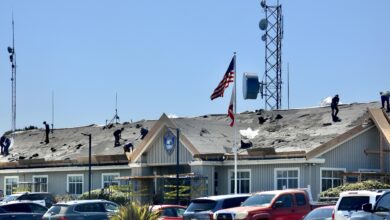Obama supports more wave energy, offshore drilling
President Barack Obama will help America catch up with the rest of the world in ocean alternative energy development while also pushing some new offshore oil and gas drilling.
That will be a big change, but not the one many environmentalists and local ocean advocates had hoped for.
Promising to “fix a broken process,” new Interior Secretary Ken Salazar said Tuesday he will end blatant favoritism toward oil companies while constructing a science-centered, open, public process to determine the best ways to develop the ocean for traditional and alternative energy production.
Salazar told oil and gas companies Obama won”t favor them as former President Bush did, but is “not their enemy.” New offshore oil drilling will likely be part of comprehensive energy plan that will also push development of wind, wave, ocean current and tidal energy in the ocean, he said.
The Department of Interior will keep the Bush Administration”s proposed new five-year plan for offshore oil and gas drilling on the table, while adding 180 days to its public comment period, Salazar said.
Salazar ripped the Bush Administration”s “midnight hour” spawned timetable to complete testimony on that new plan for offshore oil and gas drilling by March 23. The secretary marveled that it was finalized on Bush”s last day in office and actually became official the day after Obama”s inauguration.
“It was a headlong rush of the worst kind … it was a process rigged to force hurried decisions to be made on bad information … tilted toward the usual energy players while renewable energy companies and the interests of American consumers and taxpayers were overlooked,” Salazar said.
If accepted by the new administration in September, the new five-year Minerals Management Service plan would supercede an existing five-year plan. This would allow drilling in new areas two years earlier, as soon as 2010.
Salazar said Bush”s plan had been constructed without listening to the 150,000-plus public comments submitted, mentioning that even states” and industry input had been ignored by a drilling-happy regime unconcerned for the rules of public input.
The Bush Administration included Northern California among the proposed new areas, even though oil companies themselves didn”t ask to drill there, an investigation by this newspaper found.
The Bush Administration probably never even read all the comments, as is required, let alone consider those comments, that investigation found evidence of.
Salazar never mentioned the new Alaskan or California drilling proposed in the plan he is keeping alive, dwelling on opening new areas of the Gulf of Mexico and, perhaps, the Atlantic seaboard.
He also promised to provide federal leadership for the first time in the area of offshore renewable energy development, such as wave energy proposed off Fort Bragg and Mendocino.
“I intend to issue a final rulemaking for offshore renewables in the coming months, so that potential developers know the rules of the road,” Salazar said. “This rulemaking will allow us to move from the oil and gas only” approach of the previous administration to the comprehensive energy plan that we need.”
With a lack of presidential leadership, Bush”s Federal Energy Regulatory Commission, or FERC, bootstrapped its way into the leadership position on developing alternative energy, eschewing calls for a public rulemaking process and engaging in an open feud with the Minerals Management Service, or MMS, that the president never mediated.
Salazar didn”t mention FERC or the feud involving his MMS and no reporters asked, nor did any ask about California drilling at the one-hour press conference Tuesday. Reporters not present in Washington, D.C. were unable to ask questions.
The national media has almost entirely ignored the new five-year plan and seemed unfamiliar with its basics on Tuesday, such as the fact the existing five-year plan is still in effect.
Salazar promised to marshal the United States Geological Service, or USGS, and MMS to gather all information available on offshore oil and gas resources by March 23 — Bush”s original date for concluding the entire process.
Salazar said opening most of the Atlantic seaboard to new drilling was based on outdated information.
“Our data on available resources is very thin, and what little we have is 20 to 30 years old,” he said. “We shouldn”t make decisions to sell off taxpayer resources based on old information.”
One reporter pointed out that 45 days was still too speedy a time for MMS and USGS to legally gather any new information on oil and gas resources, such as USGS ocean floor surveys, and that thus the decision would still be made based on old information.
Salazar acknowledged that point but said this information gathering would represent the first time information was assembled and put into public reports.
Based on those reports, the department will then determine what areas need more information and create a plan for gathering that information.
Salazar said four regional conferences will then be set to review these findings, and expediting renewable energy rulemaking for the outer continental shelf.
The Bush Administration had actually promised to hold a meeting in Fort Bragg. Salazar said one meeting would be on the West Coast, one in Alaska, one on the Gulf Coast and one on the East Coast.
Salazar said he had been meeting with scientists at USGS for the past couple of days and the two agencies would again see science made paramount in decision-making.
He rebuffed critics who “feel it is better not to know what is out there” for fear that pressure to develop the outer continental shelf would become irresistible
He said the Obama Administration favored having all the information possible and developing only in an open, public and scientific way.
He pointed out that the outer continental shelf (3 to 200 miles from shore) controlled by the MMS comprises 1.7 billion acres, three-quarters the size of the entire land mass of the United States.
“If you were a landowner of 1.75 billion acres, you would want to know what is out there and what is it worth,” said Salazar.
“The American people need to [know] that as well,” he said.
Salazar”s criticism wasn”t only directed at the Bush Administration. He pointed out the nation itself had fallen into a 30-year “sleep” since President Jimmy Carter had pushed for conservation and a real energy policy.
He complained how far behind America has fallen in alternative energy development, particularly wind energy.
“The Bush Administration was so intent on opening new areas for oil and gas offshore that it torpedoed offshore renewable energy efforts,” Salazar said
One reporter asked Salazar to excuse him for being combative but said he saw not much new or the promised “change” in the proposals.
“Excuse me for being combative back, but this shows dramatic change. We are getting off the one lane highway to energy independence, which was drill, drill and drill. We are pursuing a comprehensive energy plan,” Salazar said.
Thompson responds
Congressman Mike Thompson issued the following response Tuesday afternoon:
“By extending the public comment period and making sure that there is sound science behind any policy decision, Secretary Salazar has taken the first crucial steps towards reversing the failed policies of the Bush Administration.
“This is a clear signal that important decisions about our precious natural resources will no longer be made by oil executives behind closed doors. I have told Secretary Salazar about the importance of protecting our coastline, and look forward to working with him to permanently ban drilling off the shores of the North Coast.”
Congress considers its own approach to offshore drilling
The Obama Administration laid out its strategy on Tuesday, Feb. 10, so that Congress would have that information when it began the process of composing its own strategy — on Wednesday, Feb. 11.
On Wednesday, the House Committee on Natural Resources held the first in a three-part series of oversight hearings on offshore drilling scheduled for February.
The hearings will be available in full following each at the committee”s website.
Congressional and presidential bans on new offshore oil drilling that had existed for more than a decade were removed last year when gasoline prices surged.
Wednesday”s hearing planned to feature perspectives from environmental, tourism and fishing groups, a press release said.
Actor Ted Danson of Oceana, explorer Philippe Cousteau of the Ocean Conservancy, and former Fort Bragg resident Zeke Grader, executive director of the Pacific Coast Federation of Fisherman”s Associations, were among the national fishing and ocean leaders set to testify.
The Subcommittee on Energy and Mineral Resources plans to continue its in-depth look at offshore drilling through a number of subsequent hearings beginning in March.
To read the congressional hearing after it is completed on Wednesday, go to http://resourcescommittee.house.gov.




